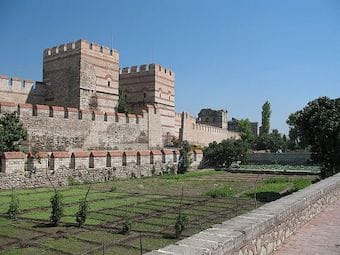HE bade the dead be swept aside; the ducal tent was pitched in this, as it were, the innermost sanctuary of the Conquest, and meat and drink were brought for his repast in the midst of the ghastly trophies of his prowess. In vain did Walter Giffard warn him of the rashness of such an act. Many of the English who lay around were not dead; many were only slightly wounded; they would rise and escape in the night, or they would seek to have their revenge, well pleased to sell their lives at the price of the life of a Norman.
But the strong heart of William feared not; God had guarded him thus far, and he trusted in God to guard him still. Then he took off his armour; his shield and helmet were seen to be dinted with many heavy blows, but the person of the Conqueror was unhurt. He was hailed by the loud applause of his troops, likening him to Roland and Oliver and all the heroes of old. Again he gave thanks to God, again he thanked his faithful followers, and sat down to eat and drink among the dead.
Précis
Brushing aside the counsels of his lieutenants, William set up his tent and his table right where Harold had fallen. Even as the vanquished lay around him, dead, dying or only wounded, the Conqueror put aside his battle-worn armour and, after giving thanks to God and saluting his men, sat down to supper. (53 / 60 words)
Brushing aside the counsels of his lieutenants, William set up his tent and his table right where Harold had fallen. Even as the vanquished lay around him, dead, dying or only wounded, the Conqueror put aside his battle-worn armour and, after giving thanks to God and saluting his men, sat down to supper.
Edit | Reset
Variations: 1.increase the length of this precis to exactly 60 words. 2.reduce the length of this precis to exactly 50 words. 3.introduce one of the following words into the precis: about, although, because, despite, if, must, unless, whether.
Archive
Find this and neighbouring posts in The Archive
Find this post and others dated 1066 in The Tale of Years
Tags: Anglo-Saxon Era (94) History (956) British History (493) Mediaeval History (168) King William I (the Conqueror) (7)
Word Games
Spinners Find in Think and Speak
For each group of words, compose a sentence that uses all three. You can use any form of the word: for example, cat → cats, go → went, or quick → quickly, though neigh → neighbour is stretching it a bit.
This exercise uses words found in the accompanying passage.
1 Inner. Midst. They.
2 Grind. Pitch. Please.
3 Die. Repast. So.
Variations: 1. include direct and indirect speech 2. include one or more of these words: although, because, despite, either/or, if, unless, until, when, whether, which, who 3. use negatives (not, isn’t, neither/nor, never, nobody etc.)
Adjectives Find in Think and Speak
For each word below, compose sentences to show that it may be used as an adjective. Adjectives provide extra information about a noun, e.g. a black cat, a round table, the early bird etc..
This exercise uses words found in the accompanying passage.
1 Best. 2 Old. 3 Ghastly. 4 Older. 5 Oldest. 6 Drunk. 7 Stronger. 8 Even. 9 Winning.
Variations: 1.show whether your adjective can also be used as e.g. a noun, verb or adverb. 2.show whether your adjective can be used in comparisons (e.g. good/better/best). 3.show whether your adjective can be used in attributive position (e.g. a dangerous corner) and also in predicate position (this corner is dangerous).
Statements, Questions and Commands Find in Think and Speak
Use each word below in a sentence. Try to include at least one statement, one question and one command among your sentences. Note that some verbs make awkward or meaningless words of command, e.g. need, happen.
This exercise uses words found in the accompanying passage.
1 Trust. 2 Phrase. 3 Fall. 4 Man. 5 Blow. 6 Back. 7 Sell. 8 Win. 9 Flower.
Variations: 1. use a minimum of seven words for each sentence 2. include negatives, e.g. isn’t, don’t, never 3. use the words ‘must’ to make commands 4. compose a short dialogue containing all three kinds of sentence: one statement, one question and one command
Add Vowels Find in Think and Speak
Make words by adding vowels to each group of consonants below. You may add as many vowels as you like before, between or after the consonants, but you may not add any consonants or change the order of those you have been given. See if you can beat our target of common words.
rls (11+3)
See Words
aerials. earls. orals. rails. realise. reels. release. relies. riles. roles. rules.
aureoles. orioles. roils.
If you like what I’m doing here on Clay Lane, from time to time you could buy me a coffee.
Buy Me a Coffee is a crowdfunding website, used by over a million people. It is designed to help content creators like me make a living from their work. ‘Buy Me a Coffee’ prides itself on its security, and there is no need to register.





